-
EngineTurbo 2.5L flat-four
-
Power305 hp / 290 lb-ft
-
Transmission6-Speed Manual
-
0-60 Time5.5 Seconds
-
Top Speed158 MPH
-
DrivetrainAll-Wheel Drive
-
Curb Weight3,384 LBS
-
Seating2+3
-
Cargo11.3 cu-ft
-
MPG17 City / 23 Hwy
Winged Wonder Offers Performance, But Does It Deliver Value?
During our weeklong stint with the 2011 Subaru Impreza WRX STI, many friends asked an all-too-obvious question: "How does it compare to the Mitsubishi Evolution?" A fair query, as the STI vs. Evo debate is something that we've pondered ever since Subaru launched its street-legal rally car in the United States back in 2004.
But then a most astute car enthusiast friend asked something that continues to trigger moments of contemplation: "Wouldn't you just rather buy a standard WRX?"
See, ever since the WRX's major overhaul in 2009 (yes, we know the redesign happened in 2008, but the big boost in power and added suspension tuning didn't come until one year later), the STI has been sort of a hard sell. To make matters worse, Subaru fitted the WRX with its big brother's widebody pieces for the 2011 model year, giving the mid-grade Impreza model the appearance of a full-on Evo competitor.
So after a week with the top-rung (and top-dollar) STI, does this Subaru still have enough panache and punch to make it worth the premium? Would we really just rather have a WRX?
When you first lay eyes on the STI sedan, you quickly fixate on one feature: its massive wing. In bringing back the proper four-door body style, Subaru fitted it with the iconic rear spoiler that adorned every generation of the STI up until the hatchback-only 2008 model. It's an audacious yet purposeful piece of fast-and-furious flare, and we simply love it. We may be hatchback lovers, but there's something about seeing that giant spoiler that makes us totally giddy. Besides, if that wing didn't evoke some sort of emotion, we wouldn't have spent an entire paragraph discussing it. Let's move on.
The STI's appearance has not changed for the 2011 model year. A brand-new Impreza is on the horizon – just as we were finally warming up to the looks of the current one – and we're curious to see how the brash, bulgy STI bits fit on the new car's body. In current form, the car has all of the styling cues to make any wannabe street racer swoon. The standard STI-spec 18-inch wheels still look fantastic and the front fascia looks as menacing as ever. Little pink STI logos accent the grille, side vents and rear fascia, and we wouldn't want them in any other color. It takes confidence to pull off pink, after all.
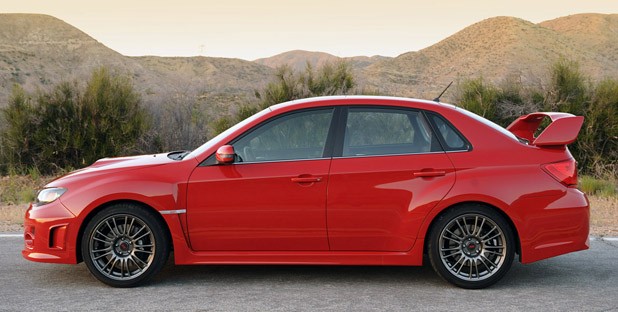
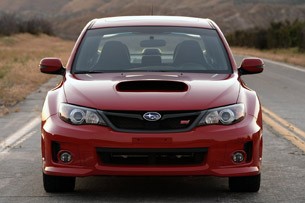
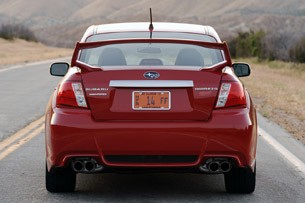
But while the STI's exterior speaks of aggression and power and ferociousness, the interior speaks of... the bargain bin. When you consider that the STI starts at $33,995, you'd be right to expect a more high-end cabin. We appreciate automakers that keep things simple when designing interiors – especially in cars that are solely made to be driven and driven hard – but we still wish the gray-plastic-smattered STI interior were a bit more inviting.
Our test car – $36,520, including $725 for destination and delivery – came fitted with heated seats (fantastically comfortable and supportive ones, at that), Bluetooth and a touchscreen media interface with navigation. The design and functionality of Subaru's system is a few years behind the rest of the industry, though, and it has some questionable quirks. Accessing features like those we commonly take for granted – tone adjustment for the stereo, say – is absolutely baffling in the STI. See what we mean in the Autoblog Short Cut video below.
We won't harp on the Subie's interior too much, only because its key competitor, the Evo, isn't exactly a shining beacon of refinement. But when you consider the other performance cars that thirty-three large will afford – a base BMW 1 Series, a loaded-up Ford Mustang GT, or tip-top Volkswagen GTI – the STI's interior looks downright third world by comparison.
But the STI was built for one sole purpose: pure driving excitement. And in this regard, the Subie certainly delivers.
Under the hood is Subaru's trusty 2.5-liter Boxer flat-four, turbocharged to the tune of 305 horsepower and 290 pound-feet of torque. Unlike the Mitsubishi Evo, which pairs its high-grade Evo MR with a six-speed dual-clutch gearbox, Subaru once again keeps it simple by solely offering a six-speed manual transmission in the STI. We aren't complaining, and though it takes some getting used to, we're smitten with the action of the somewhat heavy clutch and notchy shifter. Perfect rev-matching during downshifting is surprisingly easy to pull off in the STI, and though we'd want an easier setup for stop-and-go commuting, during serious driving, the STI's transmission fits our driving style perfectly.
Acceleration isn't nearly as linear as the less-powerful WRX, which itself suffers from turbo lag. In the STI, a huge jolt of power comes on right around 3,500 rpm, just before the full 290 lb-ft is delivered only 500 rpm later. There's still a good amount of torque available down low, but you'll want to downshift from sixth to fourth while passing on the highway. In these situations, the STI doesn't really show itself as a true triumph over the 265-hp WRX, and with the little brother's taller ratios in its five-speed manual transmission, the need to downshift often doesn't feel as necessary for quick bumps of power at speed.
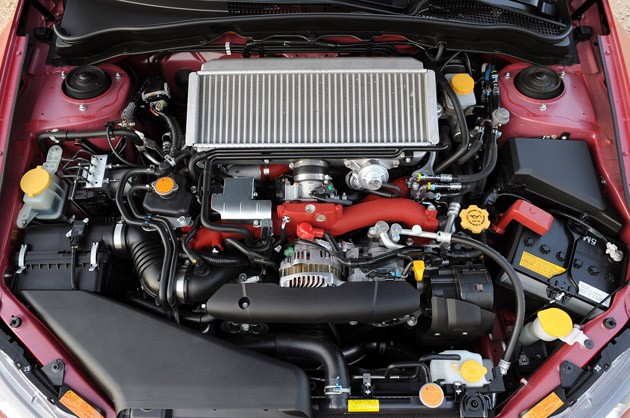
Of course, one of the biggest features that separates the STI from garden-variety WRXs is that it comes with Subaru's SI-Drive on-the-fly dynamic adjustment feature. The standard Sport setting is just fine for 90 percent of all driving situations, but we couldn't help but twist the knob to the left and power along in Sport Sharp at all times. The improvement in throttle response is what really sells us here, and after long stints in Sharp, knocking the STI back into standard Sport mode just made the car feel sluggish. There's an Intelligent mode, which adjusts the car's dynamics on the go, and you can even control the amount of lock to the center differential, but with that last part, just leave it in 'auto' unless you're really keen on sending certain amounts of power to the front and rear axles (as you might want to while autocrossing or when channeling your inner Petter Sollberg).
As you'd expect, the STI's suspension is substantially stiffer than the base setup in the WRX. And while we'd gladly welcome this during serious track day efforts, it's a bit back-breaking during everyday driving, especially on the cracked and pothole-laden roads in and around Detroit. This is the sort of level of involvement that we'd expect in a car like the STI, though, and while the suspension has a tendency to be crashy, it's not as bone-shattering as an Evo or even Mitsu's more subdued Lancer Ralliart (it also leans a bit more as a result). The Subaru feels better sorted and balanced than its Japanese rival in this regard, but for longer stints behind the wheel, and as a daily driver, we'd gladly welcome something more akin to what's fitted in the standard WRX.
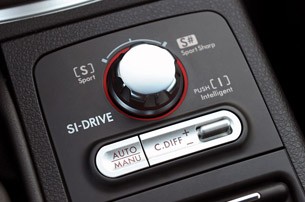
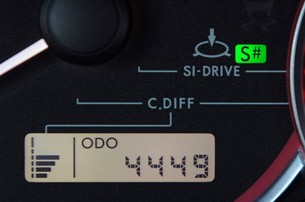
Steering feel is exactly the same as what you get in the WRX – that is to say, the car is easily tossable with a nicely weighted steering rack that's easy to modulate at all times. We'd do evil things for a smaller-diameter, thicker wheel in the STI in order to really make the most of the steering involvement, but that'd surely only add more money to the already lofty price tag.
The brakes, however, are truly magnificent. Subaru has fitted the STI with 13-inch Brembo stoppers up front with six-piston calipers and 12.6-inch rotors with two-piston calipers out back. Braking feel is sure-footed and secure without feeling overly sensitive when initially stomping on the middle pedal.
The caveat here is that Fuji Heavy offers a host of upgrades from its Subaru Performance Tuning division that you can fit to your standard WRX for a nominal fee. Things like STI-spec shift linkage and brakes will easily give your 'Rex a more performance-tuned feel on the road, and even with the added cost of these up-fits, you'll still likely save money over an STI.
You see, a standard 265-hp WRX starts at just $25,495 for either the sedan or hatchback. The STI sedan adds a full $8,500 to that – $10,500 if you want the five-door hatchback. And while you'd think that nets you a whole host of interior upgrades, it doesn't. That price only covers the added power, revised suspension with SI-Drive and, of course, a giant wing. By the numbers, it just doesn't seem worth it, and $8,500 will buy you a smattering of SPT upgrades.
And herein lies the answer. The STI is a hilariously fun car, but for most buyers, the smart money is on the less costly WRX. It's easier to live with for everyday driving tasks, and if you're really serious about having a properly tuned track car, you can just open the SPT catalog and order your goodies à la carte, or seek out aftermarket solutions. But instead of viewing this as a thumbs-down for the STI, think of this as two thumbs way up for the WRX. As Subaru continues to improve upon the STI recipe, the WRX franchise will only get better, and that's something we can all get excited about.
2011 Subaru Impreza WRX STI – Click above for high-res image gallery
During our weeklong stint with the 2011 Subaru Impreza WRX STI, many friends asked an all-too-obvious question: "How does it compare to the Mitsubishi Evolution?" A fair query, as the STI vs. Evo debate is something that we've pondered ever since Subaru launched its street-legal rally car in the United States back in 2004.
But then a most astute car enthusiast friend asked something that continues to trigger moments of contemplation: "Wouldn't you just rather buy a standard WRX?"
See, ever since the WRX's major overhaul in 2009 (yes, we know the redesign happened in 2008, but the big boost in power and added suspension tuning didn't come until one year later), the STI has been sort of a hard sell. To make matters worse, Subaru fitted the WRX with its big brother's widebody pieces for the 2011 model year, giving the mid-grade Impreza model the appearance of a full-on Evo competitor.
So after a week with the top-rung (and top-dollar) STI, does this Subaru still have enough panache and punch to make it worth the premium? Would we really just rather have a WRX?
When you first lay eyes on the STI sedan, you quickly fixate on one feature: its massive wing. In bringing back the proper four-door body style, Subaru fitted it with the iconic rear spoiler that adorned every generation of the STI up until the hatchback-only 2008 model. It's an audacious yet purposeful piece of fast-and-furious flare, and we simply love it. We may be hatchback lovers, but there's something about seeing that giant spoiler that makes us totally giddy. Besides, if that wing didn't evoke some sort of emotion, we wouldn't have spent an entire paragraph discussing it. Let's move on.
The STI's appearance has not changed for the 2011 model year. A brand-new Impreza is on the horizon – just as we were finally warming up to the looks of the current one – and we're curious to see how the brash, bulgy STI bits fit on the new car's body. In current form, the car has all of the styling cues to make any wannabe street racer swoon. The standard STI-spec 18-inch wheels still look fantastic and the front fascia looks as menacing as ever. Little pink STI logos accent the grille, side vents and rear fascia, and we wouldn't want them in any other color. It takes confidence to pull off pink, after all.



But while the STI's exterior speaks of aggression and power and ferociousness, the interior speaks of... the bargain bin. When you consider that the STI starts at $33,995, you'd be right to expect a more high-end cabin. We appreciate automakers that keep things simple when designing interiors – especially in cars that are solely made to be driven and driven hard – but we still wish the gray-plastic-smattered STI interior were a bit more inviting.
Our test car – $36,520, including $725 for destination and delivery – came fitted with heated seats (fantastically comfortable and supportive ones, at that), Bluetooth and a touchscreen media interface with navigation. The design and functionality of Subaru's system is a few years behind the rest of the industry, though, and it has some questionable quirks. Accessing features like those we commonly take for granted – tone adjustment for the stereo, say – is absolutely baffling in the STI. See what we mean in the Autoblog Short Cut video below.
We won't harp on the Subie's interior too much, only because its key competitor, the Evo, isn't exactly a shining beacon of refinement. But when you consider the other performance cars that thirty-three large will afford – a base BMW 1 Series, a loaded-up Ford Mustang GT, or tip-top Volkswagen GTI – the STI's interior looks downright third world by comparison.
But the STI was built for one sole purpose: pure driving excitement. And in this regard, the Subie certainly delivers.
Under the hood is Subaru's trusty 2.5-liter Boxer flat-four, turbocharged to the tune of 305 horsepower and 290 pound-feet of torque. Unlike the Mitsubishi Evo, which pairs its high-grade Evo MR with a six-speed dual-clutch gearbox, Subaru once again keeps it simple by solely offering a six-speed manual transmission in the STI. We aren't complaining, and though it takes some getting used to, we're smitten with the action of the somewhat heavy clutch and notchy shifter. Perfect rev-matching during downshifting is surprisingly easy to pull off in the STI, and though we'd want an easier setup for stop-and-go commuting, during serious driving, the STI's transmission fits our driving style perfectly.
Acceleration isn't nearly as linear as the less-powerful WRX, which itself suffers from turbo lag. In the STI, a huge jolt of power comes on right around 3,500 rpm, just before the full 290 lb-ft is delivered only 500 rpm later. There's still a good amount of torque available down low, but you'll want to downshift from sixth to fourth while passing on the highway. In these situations, the STI doesn't really show itself as a true triumph over the 265-hp WRX, and with the little brother's taller ratios in its five-speed manual transmission, the need to downshift often doesn't feel as necessary for quick bumps of power at speed.

Of course, one of the biggest features that separates the STI from garden-variety WRXs is that it comes with Subaru's SI-Drive on-the-fly dynamic adjustment feature. The standard Sport setting is just fine for 90 percent of all driving situations, but we couldn't help but twist the knob to the left and power along in Sport Sharp at all times. The improvement in throttle response is what really sells us here, and after long stints in Sharp, knocking the STI back into standard Sport mode just made the car feel sluggish. There's an Intelligent mode, which adjusts the car's dynamics on the go, and you can even control the amount of lock to the center differential, but with that last part, just leave it in 'auto' unless you're really keen on sending certain amounts of power to the front and rear axles (as you might want to while autocrossing or when channeling your inner Petter Sollberg).
As you'd expect, the STI's suspension is substantially stiffer than the base setup in the WRX. And while we'd gladly welcome this during serious track day efforts, it's a bit back-breaking during everyday driving, especially on the cracked and pothole-laden roads in and around Detroit. This is the sort of level of involvement that we'd expect in a car like the STI, though, and while the suspension has a tendency to be crashy, it's not as bone-shattering as an Evo or even Mitsu's more subdued Lancer Ralliart (it also leans a bit more as a result). The Subaru feels better sorted and balanced than its Japanese rival in this regard, but for longer stints behind the wheel, and as a daily driver, we'd gladly welcome something more akin to what's fitted in the standard WRX.


Steering feel is exactly the same as what you get in the WRX – that is to say, the car is easily tossable with a nicely weighted steering rack that's easy to modulate at all times. We'd do evil things for a smaller-diameter, thicker wheel in the STI in order to really make the most of the steering involvement, but that'd surely only add more money to the already lofty price tag.
The brakes, however, are truly magnificent. Subaru has fitted the STI with 13-inch Brembo stoppers up front with six-piston calipers and 12.6-inch rotors with two-piston calipers out back. Braking feel is sure-footed and secure without feeling overly sensitive when initially stomping on the middle pedal.
The caveat here is that Fuji Heavy offers a host of upgrades from its Subaru Performance Tuning division that you can fit to your standard WRX for a nominal fee. Things like STI-spec shift linkage and brakes will easily give your 'Rex a more performance-tuned feel on the road, and even with the added cost of these up-fits, you'll still likely save money over an STI.
You see, a standard 265-hp WRX starts at just $25,495 for either the sedan or hatchback. The STI sedan adds a full $8,500 to that – $10,500 if you want the five-door hatchback. And while you'd think that nets you a whole host of interior upgrades, it doesn't. That price only covers the added power, revised suspension with SI-Drive and, of course, a giant wing. By the numbers, it just doesn't seem worth it, and $8,500 will buy you a smattering of SPT upgrades.
And herein lies the answer. The STI is a hilariously fun car, but for most buyers, the smart money is on the less costly WRX. It's easier to live with for everyday driving tasks, and if you're really serious about having a properly tuned track car, you can just open the SPT catalog and order your goodies à la carte, or seek out aftermarket solutions. But instead of viewing this as a thumbs-down for the STI, think of this as two thumbs way up for the WRX. As Subaru continues to improve upon the STI recipe, the WRX franchise will only get better, and that's something we can all get excited about.
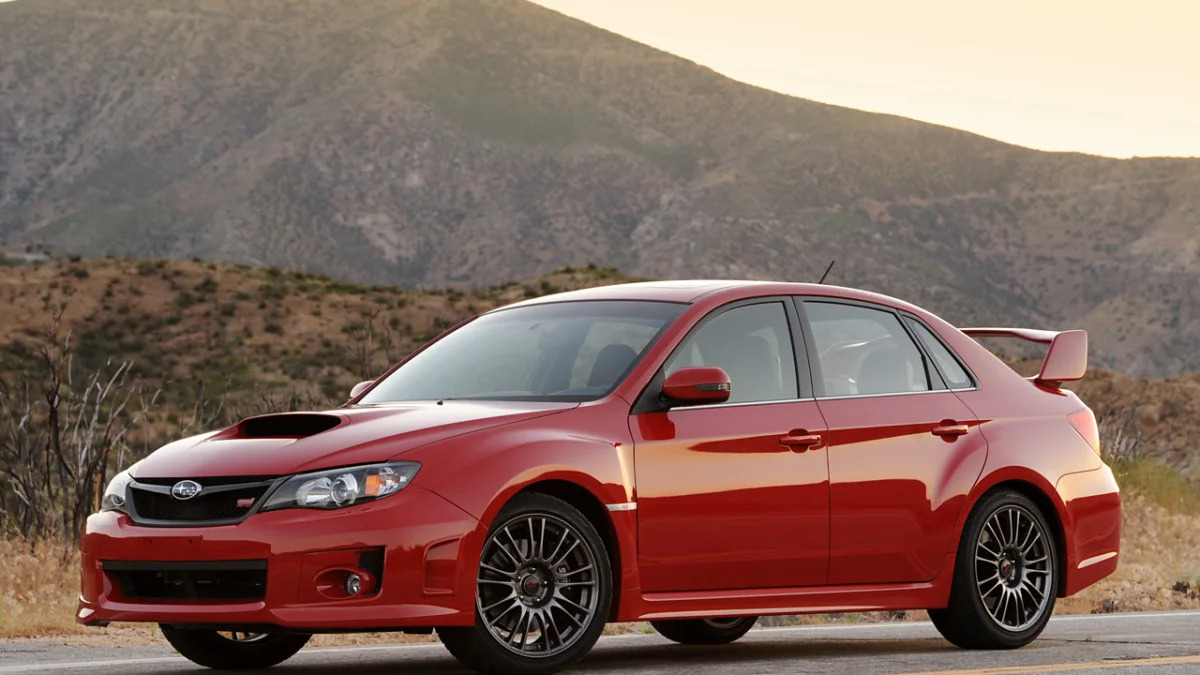
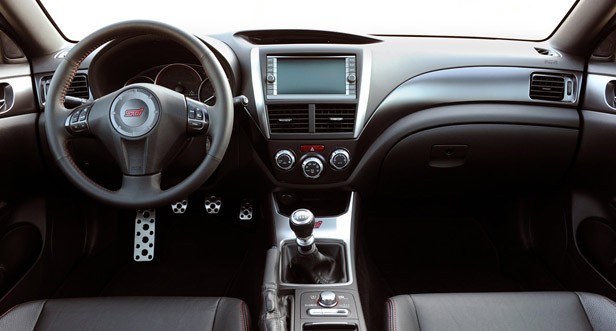
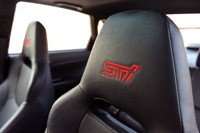
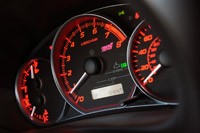
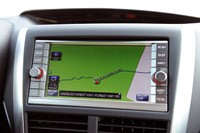
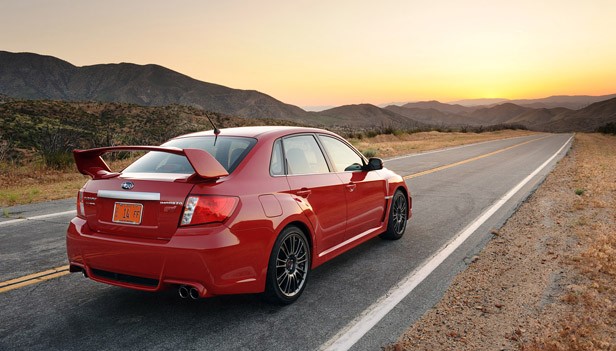
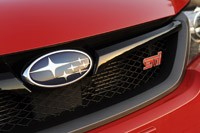
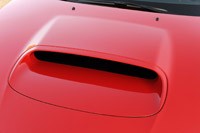
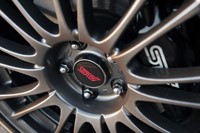









Sign in to post
Please sign in to leave a comment.
Continue